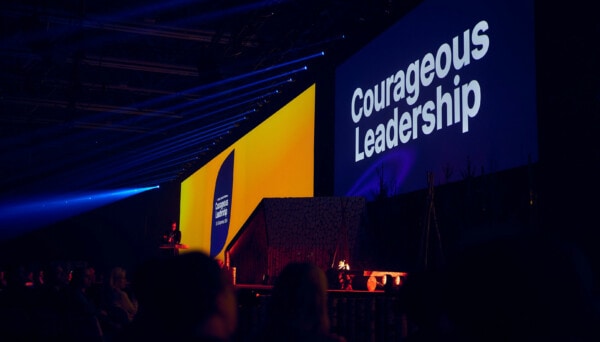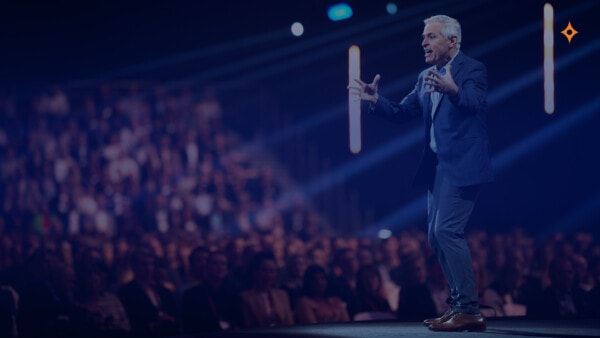29Sep2023
Day 2 of the Nordic Business Forum delivered another round of thought provoking speeches centred on activism, AI, and ethics. For more inspiration on how to be the change you want to see in the world, read our key takeaways from yesterdays program below.
Nicolai Tangen: Transparency is key to productivity
“The best companies in the world are those where information flows most freely.”
You only get to manage one of the world’s most successful investment funds if you deeply understand the building blocks of a successful enterprise. According to Nicolai Tangen, while short-term resilience, long-term performance, and the presence of creative, lifelong learners are good indicators of business success, the importance of transparent, meaningful communication throughout these organisations cannot be understated.
Tangen’s advice was simple, but powerful: “capture, transcribe and publish notes from leadership group meetings.” He went on to explain that these notes are the most widely read internal content at Norges Bank Investment Management, because they “let everybody in the business know what’s coming down the pipeline.”
This principle of transparency is applied at all levels of the fund, and the impacts are manifold: everybody knows what everybody else is working on, creativity increases as a result of increased psychological safety, and performance optimises through continuous, open feedback loops. If you haven’t done so already, it might be time to get this conversation started at your business.
Tim Ferriss: Solve for focus, not efficiency
“You can become very good at doing trivial things.”
Systematic laziness, process whispering, productivity hacking – when it comes to leveraging time and effort for results, Tim Ferriss is the master of getting the greatest amount of outputs from the fewest inputs. And for Ferriss, this means “being effective, because effectiveness is much more important than being efficient.”
It is only by focusing on the right things at the right time that you build the most elegant processes and impactful outcomes. As Ferriss attests, “Adding more effort to an inefficient process makes it worse.” Ferriss also advises caution when turning to technology, which he believes is often overvalued as an agent of effectiveness. For him, this first step is always to clearly define your objectives before you deploy new tools.
Ferriss’ objective setting process starts with curiosity. Learning how to learn. Asking the right questions from the right people. Discovering the most common mistakes people make – and learning how to mitigate them. He begins each morning by considering “which 3 things I need to do to make this a day well spent.” He also ruthlessly removes agenda items that do not contribute to his objectives. Practise this level of focus, and effectiveness will follow.
Amy Webb: Technology has the same blindspots as its builders
“Who’s training these systems?”
If a futurist like Amy Webb admits she can’t predict where AI is heading, then some sympathy should be extended to the business leaders everywhere currently tasked with becoming AI experts overnight.
Yes, generative AI tools like Chat GPT are miracles of assistive computing. Answers to complex business questions now arrive in seconds, not days. In board rooms everywhere, mass layoff proposals (for better bottom line results, of course) are being tabled. But the deeper context of where these insights come from, and if they should be trusted, is being overlooked.
Right now, in places like Kenya and Pakistan, thousands of gig economy workers spend countless hours each day annotating answers generated by language learning models (LLMs). Some queries are relatively simple – an elbow can be distinguished from a knee with a high degree of certainty. But, “you need a doctor to train a system if you want it to deliver safe medical advice.”
So, before jumping headlong into AI-derived business insight, we should ask: Who’s training these systems? Should US big tech, with its own objectives and focuses, own this revolutionary technology? And can a Kenyan teenager, hired by a US company, truly train a system to understand the cultural nuance of Nordic business?
Mikko Hyppönen: Why AI is happening now
“We turned the world’s information into usable data.”
At this pivotal moment in technology, there is a tendency to focus on the path forward – the unclear, unsettling possibilities that artificial intelligence could manifest in our future. The genie is out of the bottle, so to speak, and we’re all nervously waiting to see which spells it casts. But, As Mikko Hyppönen pointed out in his keynote, it is worth understanding the steps that led to AI finally emerging as the force of change it is today.
Mikkonen stated that three technology revolutions had to first take place, separate elements that created the conditions for this perfect storm. By bringing the world’s information online, “machine learning became extremely powerful – because we had so much more to teach it.” The cloud – aside from being the 2006 B2B buzzword of the year – is the perfect place to store massively large data sets and make them accessible to everyone.
And the final piece of the puzzle, computing power, “is the tool that is now fuelling the revolution around us.” Without these breakthroughs, we would still be reading about the future of AI, instead of living it.
Sheena Iyengar: Everyone can innovate, if they know how to think
“All creative thought comes from learning – and memory.”
From Picasso to Henry Ford, ice cream to AI, the birth of every big idea throughout history follows the same pattern. “The great innovations,” according to Sheena Iyengar, “are where the whole is more than the sum of its parts.” These big ideas consist of useful, novel combinations of existing ideas that solve a complex problem. This is the essence of innovation.
So, thinking big, Iyengar states, is a function of “breaking down a complex problem into its sub parts, searching for existing solutions in the wider world, then combining these solutions in novel ways until the optimal configuration is achieved.” For this process to work, we need to furnish our brains with an inventory of pertinent information, and employ a framework that allows us to see how all the pieces connect.
Start by “avoiding the construction of useless combinations.” If you can see that a process will break down because the solution to your third subproblem is unstable, then focus here until you get it right. Follow this process, and like Henry Ford, your innovation production line will soon be up to speed.
Malala Yousafzai: Lasting change requires continuous activism
“Engage with people who do not agree with us.”
In an inspirational discussion that closed out this year’s conference, Nobel Peace Prize recipient Malala Yousafzai urged a rapt audience to not limit their aspirations for making a positive impact on the world.
“You have to remain as ambitious as you were when you were young. Do not give up on your dreams.” When Yousafzai first began her journey as an activist, she was asked where she wanted to focus her work. For her, that was the wrong question. She didn’t just want to help a region. She wanted to help young girls everywhere attend school and receive an education.
“As we age, we may lose the boundless ambition of our youth. But the problems of the world do not go away.” As an example, it was revealed that up to 20 million girls were unlikely to return to the classroom after staying at home during the recent pandemic.
Yousafzai also gave a clear call to action for more activists to join the cause, “because we need to accelerate the pace of change.” Activism is not just about the fight for human rights. It is vital for maintaining the progress we’ve already made, and for further building towards the world we envision.


